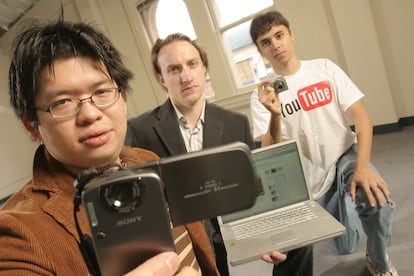
Jawed Karim Net Worth: The YouTube Co-Founder Who Chose Privacy Over Fame
In 2005, a 25-year-old computer engineer named Jawed Karim stood in front of an elephant exhibit at the San Diego Zoo and recorded what would become the first video in YouTube history. Titled Me at the Zoo, the 19-second clip seemed unremarkable at the time. Yet, that moment marked the beginning of a revolution in digital content that would reshape the internet forever.
Fast forward to 2025, and YouTube is a global media giant. With over 114 million channels and a valuation of more than $50 billion, the platform remains a dominant force in online entertainment. But while the names of YouTube co-founders Chad Hurley and Steve Chen are widely recognized in tech circles, Karim has remained an enigma—one of Silicon Valley’s most influential yet reclusive figures.
The Mystery Man Behind YouTube’s Success
Unlike his co-founders, Jawed Karim has always avoided the media spotlight. Born in 1979 in Merseburg, East Germany, he moved to the United States in the early 1990s with his parents. His father, a researcher, and his mother, a scientist, instilled a deep curiosity for technology in him. Karim later attended the University of Illinois Urbana-Champaign, where he studied computer science.
It was during his time at PayPal in 1999 that Karim met Steve Chen and Chad Hurley. The three engineers often gathered at coffee shops and Hurley’s garage in Menlo Park, California, to brainstorm ideas. Initially, YouTube was intended as a dating site where people could upload videos describing themselves. However, when that concept failed to gain traction, they pivoted to a broader video-sharing platform.
On Valentine’s Day 2005, YouTube was officially registered. While all three founders played key roles in its development, Karim took a backseat compared to Chen and Hurley. In fact, he was credited as an informal adviser rather than a full-time executive, a decision that would later define his career path.
The Google Acquisition and Jawed’s Quiet Exit
YouTube’s rapid rise caught the attention of Google, which acquired the platform in 2006 for $1.65 billion in stock. Unlike Hurley and Chen, who took on leadership roles post-acquisition, Karim opted for a quieter path. He used his earnings from the sale—reportedly around $64 million—to return to academia and complete his master’s degree at Stanford University.
Many investors and colleagues were puzzled by his choice. Roelof Botha, the venture capitalist who led YouTube’s funding, once said, “He was very, very creative. We did everything we could to convince him to put the contract on hold.” But Karim had no interest in corporate fame or the business politics of running a tech empire. Instead, he seemed to prefer a life of quiet intellectual pursuit.
A Watchful Critic of the Platform He Helped Build
Despite stepping away from YouTube’s daily operations, Karim has remained an observant critic of its evolution. He occasionally updates the video description of Me at the Zoo to share his thoughts on controversial platform decisions.
For instance, in 2013, when YouTube forced users to link their Google+ accounts to comment, Karim sarcastically changed the description to: “Why the hell do I need a Google+ account to comment on a video?” The backlash from users was so strong that YouTube eventually reversed the policy.
In 2021, when YouTube decided to hide public dislike counts, Karim warned that it could lead to the platform’s decline. “The ability to easily and quickly identify inappropriate content is an essential feature of a user-generated content platform. Why? Because not all user-generated content is good,” he wrote.
To this day, he continues to use Me at the Zoo as a low-key megaphone for his opinions, subtly reminding the world that he’s still watching.
Life, Investments, and Net Worth in 2025
Now 45 years old, Karim leads a relatively private life in Palo Alto, California. Though he prefers to keep a low profile, his financial footprint in the tech world remains significant.
In 2008, he co-founded Youniversity Ventures, a venture fund aimed at supporting student entrepreneurs. One of its most notable early investments was in Airbnb, long before it became a household name. Today, Airbnb is valued at over $85 billion, and Karim’s stake in the company has contributed significantly to his wealth.
As of 2025, his estimated net worth is around $310 million—modest compared to some of his peers but more than enough for a comfortable life outside the public eye. Unlike many tech moguls, he has not indulged in extravagant spending or high-profile philanthropy. Instead, he remains quietly involved in selective investments, focusing on innovative startups rather than high-profile ventures.
YouTube at 20: A Platform That Changed the World
As YouTube celebrates its 20th anniversary, it’s impossible to ignore the impact it has had on media, education, and entertainment. What started as a simple idea from three engineers at PayPal has transformed into a cultural juggernaut, with billions of videos uploaded and watched daily.
Yet, for all its growth, YouTube has not been without controversy. Copyright disputes, misinformation, censorship debates, and the rise of influencer culture have all shaped its evolution. While Steve Chen and Chad Hurley embraced the entrepreneurial fame that came with YouTube’s success, Jawed Karim remains an anomaly—an influential figure who chose privacy over power.
The Legacy of Jawed Karim
Though he rarely speaks publicly, Karim’s influence on the internet cannot be overstated. He played a pivotal role in creating the world’s largest video-sharing platform, and his early vision helped shape YouTube into what it is today. While he may never return to the tech spotlight, his quiet critiques and strategic investments ensure that he still has a say in the digital world.
In an era where tech founders are often larger-than-life personalities, Jawed Karim stands as a reminder that sometimes, the greatest impact comes from those who prefer to stay in the background.
Popular Categories





